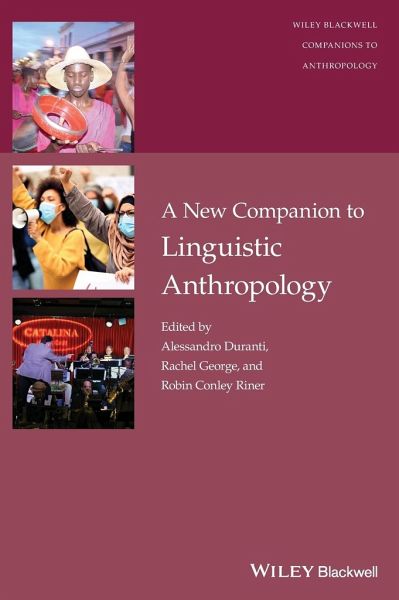
A New Companion to Linguistic Anthropology

PAYBACK Punkte
88 °P sammeln!
Provides an expansive view of the full field of linguistic anthropology, featuring an all-new team of contributing authors representing diverse new perspectivesA New Companion to Linguistic Anthropology provides a timely and authoritative overview of the field of study that explores how language influences society and culture. Bringing together more than 30 original essays by an interdisciplinary panel of renowned scholars and younger researchers, this comprehensive volume covers a uniquely wide range of both classic and contemporary topics as well as cutting-edge research methods and emerging...
Provides an expansive view of the full field of linguistic anthropology, featuring an all-new team of contributing authors representing diverse new perspectives
A New Companion to Linguistic Anthropology provides a timely and authoritative overview of the field of study that explores how language influences society and culture. Bringing together more than 30 original essays by an interdisciplinary panel of renowned scholars and younger researchers, this comprehensive volume covers a uniquely wide range of both classic and contemporary topics as well as cutting-edge research methods and emerging areas of investigation.
Building upon the success of its predecessor, the acclaimed Blackwell Companion to Linguistic Anthropology, this new edition reflects current trends and developments in research and theory. Entirely new chapters discuss topics such as the relationship between language and experiential phenomena, the use of research data to address social justice, racist language and raciolinguistics, postcolonial discourse, and the challenges and opportunities presented by social media, migration, and global neoliberalism. Innovative new research analyzes racialized language in World of Warcraft, the ethics of public health discourse in South Africa, the construction of religious doubt among Orthodox Jewish bloggers, hybrid forms of sociality in videoconferencing, and more.
_ Presents fresh discussions of topics such as American Indian speech communities, creolization, language mixing, language socialization, deaf communities, endangered languages, and language of the law
_ Addresses recent trends in linguistic anthropological research, including visual documentation, ancient scribes, secrecy, language and racialization, global hip hop, justice and health, and language and experience
_ Utilizes ethnographic illustration to explore topics in the field of linguistic anthropology
_ Includes a new introduction written by the editors and an up-to-date bibliography with over 2,000 entries
A New Companion to Linguistic Anthropologyis a must-have for researchers, scholars, and undergraduate and graduate students in linguistic anthropology, as well as an excellent text for those in related fields such as sociolinguistics, discourse studies, semiotics, sociology of language, communication studies, and language education.
A New Companion to Linguistic Anthropology provides a timely and authoritative overview of the field of study that explores how language influences society and culture. Bringing together more than 30 original essays by an interdisciplinary panel of renowned scholars and younger researchers, this comprehensive volume covers a uniquely wide range of both classic and contemporary topics as well as cutting-edge research methods and emerging areas of investigation.
Building upon the success of its predecessor, the acclaimed Blackwell Companion to Linguistic Anthropology, this new edition reflects current trends and developments in research and theory. Entirely new chapters discuss topics such as the relationship between language and experiential phenomena, the use of research data to address social justice, racist language and raciolinguistics, postcolonial discourse, and the challenges and opportunities presented by social media, migration, and global neoliberalism. Innovative new research analyzes racialized language in World of Warcraft, the ethics of public health discourse in South Africa, the construction of religious doubt among Orthodox Jewish bloggers, hybrid forms of sociality in videoconferencing, and more.
_ Presents fresh discussions of topics such as American Indian speech communities, creolization, language mixing, language socialization, deaf communities, endangered languages, and language of the law
_ Addresses recent trends in linguistic anthropological research, including visual documentation, ancient scribes, secrecy, language and racialization, global hip hop, justice and health, and language and experience
_ Utilizes ethnographic illustration to explore topics in the field of linguistic anthropology
_ Includes a new introduction written by the editors and an up-to-date bibliography with over 2,000 entries
A New Companion to Linguistic Anthropologyis a must-have for researchers, scholars, and undergraduate and graduate students in linguistic anthropology, as well as an excellent text for those in related fields such as sociolinguistics, discourse studies, semiotics, sociology of language, communication studies, and language education.




